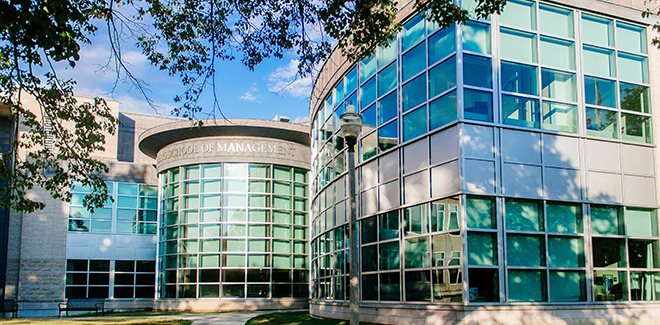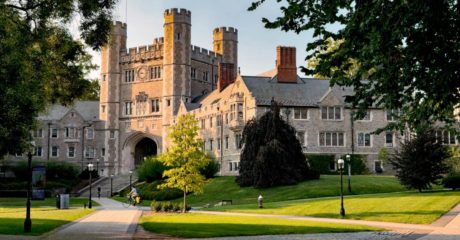The Isenberg School of Management at the University of Massachusetts-Amherst landed at No. 50 in this year’s rankings, down 16 spots from last year’s 34th place and the previous year’s 36th place.
Isenberg did best in the Admissions Standards category, placing 37th with an acceptance rate of 51.49% this year, more lenient than last year’s 41.54%, and an average SAT score of 1328, up slightly from last year’s score of 1316.
Isenberg has a comprehensive business education with resources in STEM and leverages its location in the northeast to offer students unique opportunities to work with companies such as Reebok.
CROSS-FUNCTIONAL CURRICULUM WITH STRONG FACULTY SUPPORT
Isenberg students have access to majors including Accounting, Finance, Hospitality & Tourism Management, Management, Marketing, Operations & Information Management, and Sports Management. The B-school recently added a new certificate in Corporate Real Estate that includes certification in Argus software and a new Analytics certificate at the undergraduate level.
Isenberg is a part of UMass Amherst, a major public research university and there are opportunities for Isenberg students to take advantage of resources in Engineering, Computer Science, Public Health, and beyond. Many alumni highlight how cross-functional Isenberg courses are in leveraging knowledge not only in business but also fields such as engineering and computer science.
“I had a financial engineering class where we learned the academic and practical aspects of trading and portfolio management,” one 2018 alumni told us. “We managed an option trading strategy for a semester and actively managed a strategy for the entire semester. This allowed me to apply the academic learnings from class to actual markets. I was also able to use my learnings from computer science classes I took to develop a computer model that allowed me to analyze the market and implement my strategy.”
Overall, 2019 alumni tend to view their business education positively — rating the quality of teaching in Isenberg courses at an 8.05 average rating. When asked to rate business school faculty availability for informal discussions and mentoring outside of class, 2019 alumni gave a strong 8.6 average rating.
“Courses taken at Isenberg were rigorous, but the professors really took the time to ensure each student had a strong grasp of their respective subjects,” one 2018 alumni said. “Most unique of all, Isenberg taught us how to leverage our LinkedIn profiles (which they also taught us how to perfect) to network and get interviews for prospective employment opportunities. At one point during my undergraduate career, recruiters, as well as friends who attended other universities, were inquiring as to what resources I utilized to set up my profile as they were impressed with what Isenberg had taught me.”
This level of support captures the type of education that Isenberg provides. While many B-schools have resources available for students, Isenberg’s faculty appears to go the extra mile to provide students with the resources and support they need.
UNIQUE HANDS-ON EXPERIENCES
A number of courses at Isenberg feature unique opportunities to gain hands-on experience working with neighboring companies such as Reebok and Peter Pan Bus Lines.
“Hands on interactive marketing senior thesis working with Peter Pan Bus Lines to conduct real research on current & past customers of the company and present results to company executives (including CEO & marketing director) as well as board members,” one 2018 alumni told us.
“We created a marketing strategy for Reebok that taught skills like research, development, public speaking, presentation making, and time management,” another 2018 alumni said. “I have found all of the skills useful when I entered the workplace after graduation.”
Every B-school has some sort of experiential learning experience, but Isenberg is able to leverage the relationship it has with big companies to give students an even more hands-on experience. Many alumni also highlighted the unique management opportunities they had as Isenberg students to create, plan, and execute wide-scale events.
“Soccerfest was a class in the Sport Management department where spent two semesters planning, organizing, and marketing the largest grassroots soccer tournament in the Northeast,” one 2018 alumni told us. “It was entirely student run and was a great learning experience for the event management industry as well as for game day aspects for sports. I believe they have since transferred the class to an esports tournament.”
“I was a member of the Women of Isenberg Conference Planning Committee and that was used as project work,” another 2018 graduate said. “The experience of putting together a massive event with a student run team was extremely impactful to my professional growth. From coordinating with industry professionals during the months leading up to the event and managing the conference operations (including day of resources and finances) — I knew I could handle real world business problems after graduation.”
EMPLOYMENT OUTCOMES
Isenberg students have relatively strong employment and internship prospects. Similar to last year’s 85.80% of the Class of 2020, some 85.10% of the Class of 2021 had a business-focused internship before graduating, and 76.08% of the Class of 2021 secured a full-time position within three months of graduation, down from last year’s 83.21%.
Overall, where Isenberg shines is in its cross-functional curriculum with strong faculty support and unique opportunities for students to work with large brand-name companies.
Alumni say:
“Senior Honors Thesis/Internship – worked as consultants for Carvel ice cream to create a marketing strategy for millennials. Was able to meet and work with executives throughout the semester, hold focus groups, research, and create a proposition that was delivered to the president of the company.”
“Senior year there were 2-3 400 level classes with semester long projects that would require you to use the breadth of your business knowledge such as coming up with a business idea and how to get it off the ground and start running. One in particular was to design a compensation structure for an entire company based off a number of factors.”
“Capstone was a simulation of a business and allocating money between R/D, marketing, and then deciding where to place products on a quality/size scale. We had to determine future demand and adjust our supply adequately. There were 4-5 teams in our class competing for the same ‘market’.”
Where the Class of 2020 went to work:
1.) PwC – 26
2.) EY – 18
3.) KPMG – 13
4.) RSM – 13
5.) TJX – 13
6.) Raytheon – 9
7.) BNY Mellon – 7
8.) Dell EMC – 7
8.) Deloitte – 7
10.) Wayfair – 7










